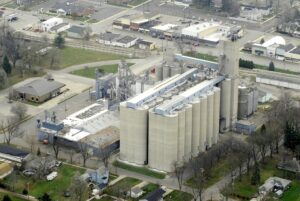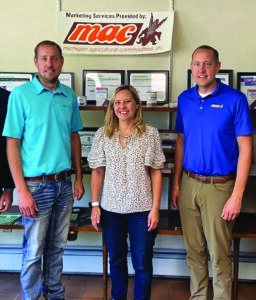How MAC Has Brought Stability and Growth to Michigan Ag for Nearly 50 Years and Counting
By DF Seeds | April 20, 2023
 Michigan Agricultural Commodities (MAC) may have started as a small trading office in Lansing in 1976, but today it’s the largest grain handler in the state.
Michigan Agricultural Commodities (MAC) may have started as a small trading office in Lansing in 1976, but today it’s the largest grain handler in the state.
That growth is a testament to MAC’s commitment to Michigan farmers. Over the course of nearly 50 years, MAC has expanded to 7 grain elevators in the state, added an agronomy business that provides fertilizer, chemicals and custom applications, and has diversified the grain they accept to meet growing demands for specialty markets like organic corn and food-grade non-GMO soybeans.
What hasn’t changed is that it’s still a family-owned business — now run by third-generation twin brothers Robert and Adam Geers — that prides itself on putting its farmers first and treating them like family.
Growing with Michigan Farmers
Meeting the needs of Michigan farmers is something MAC prides itself on and what the Geers brothers feel is a driving force to the company’s success.
“When farmers succeed, we succeed,” Robert says. “We’ve been able to grow with them as their operations get bigger and their yields increase.”
Much of that growth happened in the late 90s when a hedge-to-arrive crisis bankrupted several grain elevators in the state. MAC bought many of them and not only kept them from closing, but grew and expanded them. Since they were already experienced in the grain trade, it brought not only stability but further security for farmers.
“The biggest risk that growers have is counterparty risk to whomeverthey’re selling to,” Robert says. “Growers rely on us to be able to provide them not only a home for their grain, but also a trusted partner that’s going to pay them.”
Their expansion also ensures that growers who would have otherwise been limited in where they sold their grain have more opportunities to find the most profitable place.
“Since we are so big and we cover a wide geographic area, we’re able to provide our growers with the best homes for their grain,” Robert adds. “And when you have the best home, you get the best price available.”
Helping Farmers Capture Greater Profits
MAC is also an active participant in helping farmers maximize their profits.
Working in an industry that is so weather-dependent, MAC realized that a simple but effective change they could implement was shortening growers’ grain unloading times.
“We recognized that time is money and we wanted to speed up the process so our farmers can get back into the field quicker,” Adam says.

So in 2012, MAC implemented a new policy where they set a goal of having every farmer in and out of their facilities in 15 minutes or less, a process that normally takes 45 minutes to an hour.
They made significant improvements to their locations so that farmers don’t even have to get out of their trucks. They’re proud to say that for the last 10 years they’ve maintained that 15-minute max dump time at all of their elevators.
They’re also helping farmers become more profitable by diversifying the number of markets their farmers can sell to, including specialty markets that pay a premium. MAC has developed direct relationships with several types of end users, including ethanol plants, feed mills, and food processors who use non-GMO soybeans.
“We’ve got a sense of the pulse of what our customers want on both the end user and farmer side, and if we see there’s a need, we’re willing to step in and add a service or commodity,” says Robert.
Forming Partnerships That Benefit Michigan Ag
Creating those premium opportunities for their farmers means partnering with the right companies to meet the market. Which is why for the last 15 years, MAC has partnered with DF Seeds to provide their farmers the seed they need to successfully grow for MAC’s non-GMO food-grade soybean program.
The soybeans need to be high in protein and have a clear hilum to meet the requirements for the food-grade market, while also performing well for the grower. In a state like Michigan where its surrounding Great Lakes create a unique microclimate, that’s not as simple as it may be in other regions.

“Soybeans don’t perform the same here as they would in Indiana, Illinois, or Ohio,” Adam says, adding they have tried seed that was grown in other states that didn’t fare very well.
Because DF Seeds tests and grows all of its varieties here in the state, MAC can trust that the seed will perform well for both its farmers and its end users. Together they identify which varieties work well, and Adam says DF Seeds is great at finding good growers who can expand those varieties into a larger volume of seed for MAC’s farmers. MAC started with just one variety for the food-grade soybean market and is now up to five, all of which are DF Seeds.
It’s further evidence of MAC’s commitment to the success of Michigan farmers and Michigan agriculture.
“We’re a Michigan-based company, we want to promote Michigan-based businesses,” Adam says. “We want to work together to build a stronger environment right here in the state.”

